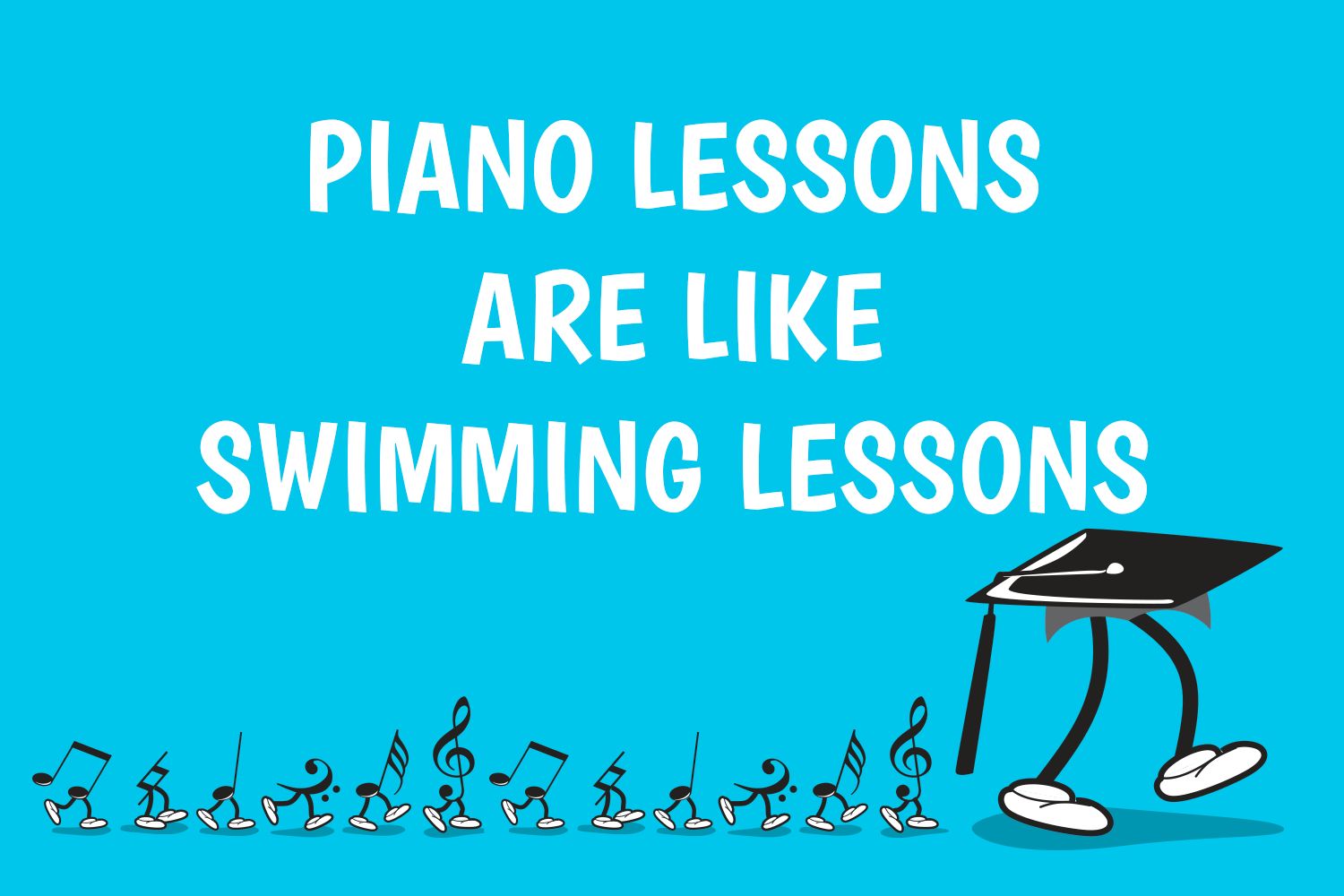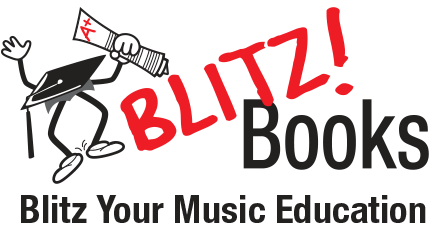Piano Lessons are Like Swimming Lessons

Well, piano lessons aren’t exactly like swimming lessons, I realise that. But in my quest to discover the best answer to the Most Commonly Asked Question of piano teachers, which is ‘When Should My Child Start Piano Lessons?’, I stumbled across an excellent analogy . My answer is simply: ‘Well it’s just the same question as “When Should My Child Start Swimming Lessons?”.
Before I explain why this is so, I would like to say that my motivation for finding and developing a convincing and creative answer to the Most Commonly Asked Question comes not only from thinking about the swimming analogy and believing that it is highly appropriate, or from being a dedicated piano teacher myself, or from being a dedicated parent myself…. No, I was mostly motivated by the fact that this Most Commonly Asked Question is usually posed to me by a parent I’ve just met at a (now no longer) relaxing dinner party on a Saturday night, or perhaps by a cab driver to whom I accidentally let slip that I’m a piano teacher, or by the massage therapist to whom I’m paying a lot of money to relax and to whom I shouldn’t have to give professional advice while trying to do so. I find that by switching the subject to swimming, it becomes a much more interesting conversation, for me anyway.
So, now to why I think this analogy works so well.
Swimming is an activity that can be taken up as early as before one is born. There are literally prenatal swimming classes. (And I mean ones you pay for, not just hanging around in the amniotic fluid.) There are swimming classes for newborns, babies, toddlers and pre-schoolers, although for the very young child this is more about water confidence than actually learning a stroke. There are also classes for kindergarten, primary and secondary school-aged children, and these may cater for the older beginner. For the advanced swimmer there is squad training, stroke correction, private coaching… the list goes on. There is no age too early to start swimming, and never a time when you can say you’ve ‘finished’ swimming lessons, because there is always some refinement that can be done.
It is the same with piano – or rather with music in general.
There are music classes for babies. These are mostly enjoyed by the mother, but studies show that they are still quite fun for the baby. There are more intensive music classes for toddlers, for example the Australian Music Schools’ ‘Tiny Musos’ course, which is fantastic. These classes develop listening, singing, rhythm and coordination skills. It’s too early to actually be playing a piano at this stage – just like it’s too early for a toddler to learn freestyle or backstroke – but it’s all about exposure to music (or water), and developingconfidence.
Studies have shown that around the age of four years, a child has developed the necessary finger coordination to actually sit at the piano and learn to play. In swimming terms, this is equivalent to learning how to coordinate arms and legs in a stroke. All of the lessons leading up to this point have played a crucial part. If a child has had a lifetime (i.e. about 4 years) of being in the water, and is extremely comfortable and confident, swimming skills will come much more easily.
Likewise, following a ‘lifetime’ of exposure to music, learning to play the piano is a breeze. (This is why it is often so much harder for the older beginner – especially adult beginners. There is little or no confidence, and a huge amount of self-consciousness to overcome.) The point is to have fun with whatever you’re doing and whatever you’re learning, and if you feel confident before you even start, as well as having developed some essential rhythmic and aural skills, you have a huge advantage.
As we move through the beginner stages of piano, there are more and more coordination challenges to overcome. We learn to play with one hand, then the other, then both at the same time; then faster, then staccato, then with pedal; we learn to play with others, to listen and sing as well as play… and we can never say that piano is ‘finished’ (yes that’s right, Grade 8 is not The End), because there is always some more we can learn and refine and develop. Just as some swimmers keep up their training and turn professional, some pianists do the same with music.
But here is where the analogy has the potential to stop. With swimming, you don’t have to be competitive, you don’t have to have long term lessons or coaching; once you know how to swim you can simply enjoy recreational swimming for the rest of your life. Wouldn’t it be wonderful if this were the same with piano? Learn for a couple of years until you know how, and then just play for pleasure when you feel like it? Sadly, this does not happen. Children can learn for years, practising diligently on their Mozart sonatas, mastering their scales and arpeggios, receiving wonderful A+ results in their exams over the years… and then as soon as they stop having lessons, they can’t play anything. The fine motor skills required to play all those pieces just do not hang around without constant reinforcement.
Almost every parent I know likes the idea that their child will continue to play and enjoy the piano (or any instrument) long after lessons have stopped. After all, it’s a big investment, and we’d like to think it’s having a long term effect! So how can we make this happen?
There are two musical skills that are absolutely essential to teach, to achieve this goal: improvisation (i.e. composing, playing by ear, listening and responding, basically making stuff up) and sight reading (i.e. looking at notes on a page and immediately being able to convert them to sound on an instrument, with a sense of rhythm and fluency).
The ability to improvise is a wonderful asset – we can play in a band without any music, work out that song on the radio, or express ourselves through our own composition. The ability to sight read well gives musicians access to any music, any time, regardless of whether we’ve heard it before or whether much practice has taken place recently! And the combination of these two skills is the recipe for long term musical enjoyment.
So the real answer to the Most Commonly Asked Question is: there is no time too early to start music, but once lessons have begun, make sure your child learns from a teacher who values and will nurture these important and fundamental musical skills. We don’t only want our children to play now, while their having lessons… we want them to have music for life, for recreation, for relaxation, for… ever, – just like swimming.

I like this so much 🙂 🙂 🙂 I’m currently working on the f# minor nocturne! they’re beautiful pieces.Don’t get me wrong, you have to be strong and confident to be successful in just about anything you do – but with music, there’s a deeper emotional component to your failures and successes. If you fail a chemistry test, it’s because you either didn’t study enough, or just aren’t that good at chemistry (the latter of which is totally understandable). But if you fail at music, it can say something about your character. It could be because you didn’t practice enough – but, more terrifyingly, it could be because you aren’t resilient enough. Mastering chemistry requires diligence and smarts, but mastering a piano piece requires diligence and smarts, plus creativity, plus the immense capacity to both overcome emotional hurdles, and, simultaneously, to use that emotional component to bring the music alive.
Before I started taking piano, I had always imagined the Conservatory students to have it so good – I mean, for their homework, they get to play guitar, or jam on their saxophone, or sing songs! What fun! Compared to sitting in lab for four hours studying the optical properties of minerals, or discussing Lucretian theories of democracy and politics, I would play piano any day.
But after almost three years of piano at Orpheus Academy, I understand just how naïve this is. Playing music for credit is not “easy” or “fun” or “magical” or “lucky.” Mostly, it’s really freakin’ hard. It requires you to pick apart your piece, play every little segment over and over, dissect it, tinker with it, cry over it, feel completely lame about it, then get over yourself and start practicing again. You have to be precise and diligent, creative and robotic. And then – after all of this – you have to re-discover the emotional beauty in the piece, and use it in your performance.